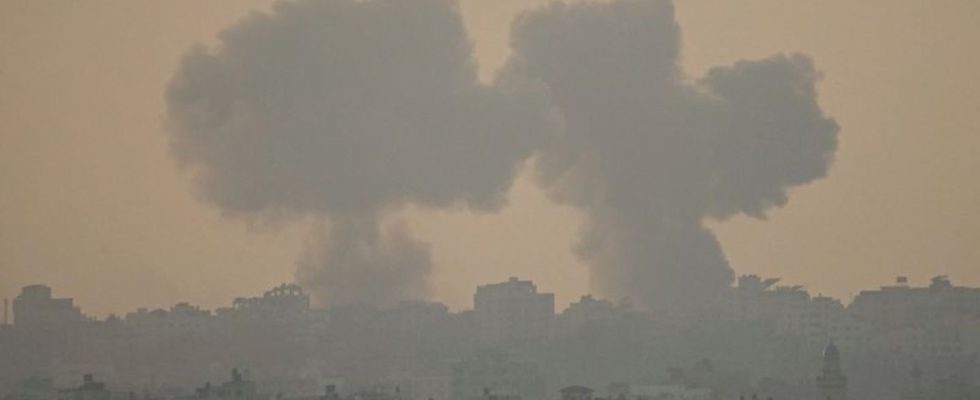After Hamas attack
EU states are struggling to find a common line in the Middle East conflict
Smoke rises after an Israeli air strike on the Gaza Strip. photo
© Ariel Schalit/AP/dpa
The more people die in the Israeli counteroffensive after the Hamas attack, the more intense the discussions about Middle East policy become. The EU foreign ministers are meeting today.
On the one hand, there are states like Germany and Hungary that fundamentally view the current counterattack by the Israeli army as legitimate self-defense. On the other hand, there are countries such as Spain, Ireland and Belgium that are critical of Israel’s actions in the Hamas-controlled Gaza Strip and are calling for a humanitarian ceasefire in view of the many civilian victims.
There is a lot at stake for the EU in the discussions. “If we fail to speak with one voice, we will not be able to contribute to de-escalation in the region in the short or long term,” a senior EU official warned over the weekend. In general, it is about the EU’s claim to play a role as a bridge builder and peacemaker at the international level.
The Russian war of aggression also plays a role
At the same time, however, all sides are currently insisting on their positions. The group with countries like Spain is warning that too much support for Israel could damage the EU’s credibility as a defender of international law – especially if there are significantly more civilian victims in the Gaza Strip in the coming weeks and months .
There is also a concrete risk that previous efforts to persuade the Global South to cooperate more strongly against Russia’s war of aggression against Ukraine could be rendered obsolete. This is considered conceivable because many people, especially in poorer and disadvantaged countries, sympathize with the Palestinians and their aspirations for their own state.
Another group, however, argues that it is vital for Israel to restore deterrence after the devastating Hamas attacks and that the EU must strongly and decisively support the country’s right to self-defense.
The EU’s positioning in the conflict remains unclear
Even among the top representatives of the European institutions there are disputes about the right course. EU Foreign Affairs Representative Josep Borrell and EU Council President Charles Michel have already accused Ursula von der Leyen’s EU Commission of harming the European Union’s interests in the region and exacerbating tensions and hatred with a course that is too Israel-friendly. The background was a declaration, which has since been withdrawn, to temporarily freeze development aid payments to the Palestinians.
On the other hand, there is criticism that EU Foreign Affairs Representative Borrell has discredited himself with his clear positioning as a possible mediator, as he is no longer an acceptable conversation partner for the Israelis.
What happens next with the EU’s positioning in the conflict could become clear this Monday at the foreign ministers’ meeting or at the end of the week at the October summit of heads of state and government. The latter last agreed on a compromise text for a joint declaration around a week ago. It states that we strongly condemn Hamas and its brutal and indiscriminate attacks throughout Israel.
At the same time, however, it is emphasized that Israel must exercise its right to defense “in accordance with international law and international humanitarian law” and that the protection of all civilians must be ensured. There has so far been no mention of the demand for a ceasefire, as recently put forward by Spanish Prime Minister Pedro Sánchez, among others.

